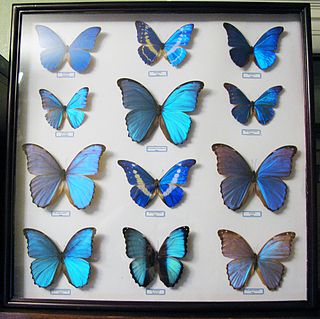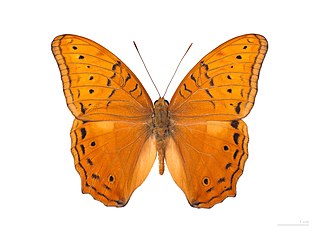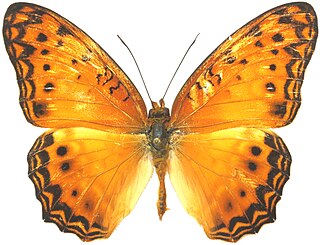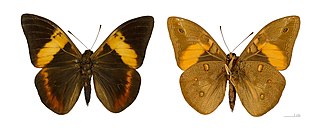
Danainae is a subfamily of the family Nymphalidae, the brush-footed butterflies. It includes the Daniadae, or milkweed butterflies, who lay their eggs on various milkweeds on which their larvae (caterpillars) feed, as well as the clearwing butterflies (Ithomiini), and the tellervini.

The Nymphalidae are the largest family of butterflies, with more than 6,000 species distributed throughout most of the world. Belonging to the superfamily Papilionoidea, they are usually medium-sized to large butterflies. Most species have a reduced pair of forelegs and many hold their colourful wings flat when resting. They are also called brush-footed butterflies or four-footed butterflies, because they are known to stand on only four legs while the other two are curled up; in some species, these forelegs have a brush-like set of hairs, which gives this family its other common name. Many species are brightly coloured and include popular species such as the emperors, monarch butterfly, admirals, tortoiseshells, and fritillaries. However, the under wings are, in contrast, often dull and in some species look remarkably like dead leaves, or are much paler, producing a cryptic effect that helps the butterflies blend into their surroundings.

The superfamily Papilionoidea contains all the butterflies except for the moth-like Hedyloidea.

The Heliconiinae, commonly called heliconians or longwings, are a subfamily of the brush-footed butterflies. They can be divided into 45–50 genera and were sometimes treated as a separate family Heliconiidae within the Papilionoidea. The colouration is predominantly reddish and black, and though of varying wing shape, the forewings are always elongated tipwards, hence the common name.

The Nymphalinae are a subfamily of brush-footed butterflies. Sometimes, the subfamilies Limenitidinae, and Biblidinae are included here as subordinate tribe(s), while the tribe Melitaeini is occasionally regarded as a distinct subfamily. Their phylogenetics can be traced back to the Cretaceous Terrestrial Revolution after the “Cretaceous-Paleogene (K-Pg) mass extinction, followed by repeated dispersals into the rest of the Old World and the New World during various periods beginning in Eocene

The Satyrinae, the satyrines or satyrids, commonly known as the browns, are a subfamily of the Nymphalidae. They were formerly considered a distinct family, Satyridae. This group contains nearly half of the known diversity of brush-footed butterflies. The true number of the Satyrinae species is estimated to exceed 2,400.

Phalanta phalantha, the common leopard or spotted rustic, is a sun-loving butterfly of the nymphalid or brush-footed butterfly family.

The Morphinae are a subfamily of Nymphalidae butterflies that includes the morphos, the owl butterflies (Caligo), and related lineages. It is either considered a sister group of the Satyrinae, or disassembled and included therein.

Phalanta alcippe, the small leopard, is a butterfly of the nymphalid or brush-footed butterfly family found in Asia.

Libythea labdaca, the African snout butterfly, is a member of the butterfly subfamily Libytheinae found in western and central Africa.

Vagrantini is a tribe of butterflies in the subfamily Heliconiinae found from east Africa over the Indian subcontinent to eastern Asia and Australia.

Sevenia, commonly called tree nymphs, is a genus of forest butterflies in the family Nymphalidae that, as larvae, feed on plants of the family Euphorbiaceae. There are fourteen species from continental Africa and two species from Madagascar. See Idea for the genus of Southeast Asian tree nymphs.

Phalanta is a genus of butterflies, called leopards, in the family Nymphalidae. The genus ranges from Africa to northern Australia.

Phalanta eurytis, the forest leopard, forest leopard fritillary, or African leopard fritillary, is a butterfly of the family Nymphalidae. It is found in tropical Africa, Ethiopia, and Sudan.
Phalanta philiberti is a butterfly in the family Nymphalidae. It is found on the Seychelles, where it has not been collected since 1953.

Euxanthe madagascariensis is a butterfly in the family Nymphalidae first described by Hippolyte Lucas in 1843. It is found on Madagascar. The habitat consists of forests.

Sevenia madagascariensis is a butterfly in the family Nymphalidae. It is found on Madagascar. The habitat consists of forests.

Brassolis sophorae is a species of large butterfly in the family Nymphalidae. It is found in South America.
















